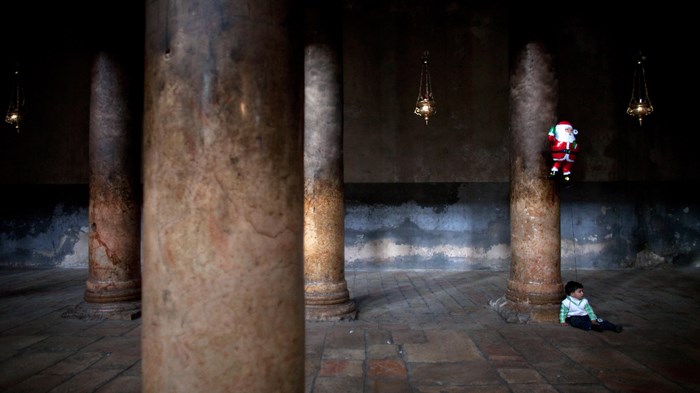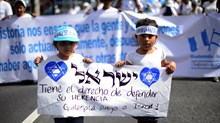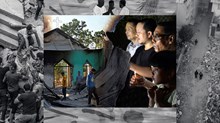
There will be no Christmas lights in Bethlehem this year.
In solidarity with the suffering in Gaza due to the Israel-Hamas war, last week Christian leaders and municipal authorities in the West Bank city decided to cancel all public festivities. For the first time since modern celebrations began, the birthplace of Jesus will not decorate the Manger Square tree.
It is “not appropriate,” stated local authorities.
But the Bethlehem decision is only the most recent. One week earlier, the Patriarchs and Heads of the Churches in Jerusalem asked Christians in the Holy Land to refrain from “unnecessarily festive” Christmas activities. Catholic churches in Galilee requested the same, as did the Council of Local Evangelical Churches in the Holy Land.
“Due to the thousands killed—and in prayer for peace,” said its president, pastor Munir Kakish, “we will only hold traditional services and devotionals on the meaning of Christmas.”
The initiative, however, came first from Jordan, home to the world’s largest concentration of Palestinian refugees—many of whom have become citizens. On November 2, the Jordan Council of Church Leaders (JCCL) announced the cancellation of Christmas celebrations.
Christmas is a public holiday in the Muslim-majority nation, with many city squares and shopping malls feted with seasonal decorations. But congregations throughout the country will now forgo the traditional festivities of public tree lighting, Christmas markets, scout parades, and distribution of gifts to children.
Religious services in all locations will continue.
“In our homes we can celebrate, but in our hearts we are suffering,” said Ibrahim Dabbour, JCCL general secretary and a Greek Orthodox priest. “How can we decorate a Christmas tree?”
The formal Jordanian Christian declaration reflected respect for the “innocent victims” and denounced the “barbaric acts” of the Israeli military. It recognized the “difficult time” in both Gaza and all Palestine, noting the destruction of homes, schools, hospitals, and places of worship.
It pledged that offerings collected last weekend would be donated to Gaza.
Dabbour, whose parents were refugees from the now-Israeli cities of Ramla and Jaffa in the 1948 war, was born in Amman and serves as the chairman of the Jordan Bible Society. He linked the current war to that original displacement, calling for dialogue rather than further fanaticism-inducing violence.
But beyond solidarity within the depressed national mood, Dabbour said the council, representing 130,000 Christians in the Hashemite kingdom, had another purpose in the declaration.
“Many Muslims do not know the history of Christianity, thinking we are a people of the West,” he said. “But we are the sons of St. Peter, here for 2,000 years. We want to show society that we are one people.”
Jordan’s evangelicals believe they have a further obligation.
“We have a role to speak to our friends in the West,” said David Rihani, president and general superintendent of the Assemblies of God Church of Jordan. “Jesus did not teach us to blindly side with anyone against another.”
He cited a widely shared video of Tennessee-based pastor Greg Locke calling on Israel to turn Gaza into a “parking lot” and to blow up the Dome of the Rock to make room for the Third Temple and usher in the return of Jesus. Local evangelicals, Rihani said, refuse to be associated with such Christian Zionism.
Adherence to the Christmas decision, however, issues from Jordanian culture.
Growing up 10 miles northwest of Amman in the traditional city of Salt, a UNESCO World Heritage site, Rihani recalled that both Muslims and Christians would frequent any neighborhood wedding celebration—no invitations necessary. But if there was a funeral, any previously scheduled wedding would be either postponed or held quietly among the family.
Weddings mid-war are now treated the same.
“The announcement was not even necessary,” said Imad Mayyah, president of the Jordanian Evangelical Council (JEC). “No Jordanian is celebrating anything.”
Founded in 2006 and representing the Assemblies of God, Baptist, Nazarene, Free Evangelical, and Christian and Missionary Alliance denominations, the JEC released its own statement on Tuesday.
“The Christmas holidays, when we remember the birth of our savior Jesus Christ, comes upon us while we are in the midst of a human tragedy that is ravaging our region,” stated the evangelical council. “In obedience to the Holy Word of God and in line with [both Christian and public sentiment, the JEC] has decided to limit the celebrations of Christmas to religious ceremonies and church prayers within our churches.”
The JEC also prayed for the leadership of King Abdullah and the crown prince.
Last week, the king published an op-ed reiterating Jordan’s support for a two-state solution. In late October, he canceled a regional summit in Amman with US president Joe Biden, protesting Israel’s “collective punishment” of Gaza. On November 1, Abdullah withdrew Jordan’s ambassador from Israel, and two weeks later signaled that “all options” were on the table.
Jordan was the second Arab nation to sign a peace treaty with Israel, in 1994.
The Hashemite kingdom has guarded its role as custodian of Jerusalem’s Muslim and Christian religious sites since 1924. It maintained this right even as it relinquished sovereignty over the West Bank in 1988.
But with over 180 Palestinians killed by Israeli forces or Jewish settlers in the West Bank since the war began, the foreign minister stated that any move to drive Palestinians across the Jordan River would be considered a “red line” amounting to a declaration of war.
The Jordanian army has since fortified its positions along the border.
The king has also designated the Jordan Hashemite Charity Organization (JHCO) to facilitate donations to the people of Gaza. Jordan has set up a military-run field hospital in the northern part of the strip, and last week sent its fifth airlift shipment in coordination with Israel and the US. Seven staff, however, were thereafter injured by Israeli shelling, which Jordan called a “heinous crime.”
Its second field hospital has now been established in south Gaza.
The JCCL statement allows each denomination to distribute its offerings to the people of Gaza through its preferred channels. Jordan’s Baptists and Assemblies of God churches are sending funds through the JHCO, while the Greek Orthodox will work directly through its Jerusalem patriarchate and its Saint Porphyrius church, where hundreds of Christians have been taking shelter.
Rihani lauded the Gaza Christians for their longstanding role in humanitarian aid. Dabbour reiterated support for the king, who stands against the fanaticism of both sides. Israel insists on being a Jewish state, he said, while Hamas says that Palestine is for Muslims.
Analysts state that the Islamist group does not have much popularity in Jordan. But as news of the October 7 terrorist atrocities spread, some Jordanians did spontaneously celebrate in the streets, distributing Arab sweets and chanting in demonstrations that followed, “All of Jordan is Hamas.”
It is not so, even among fellow Islamists. Hamas is a branch of the Muslim Brotherhood, whose colleagues in Jordan splintered into two factions in 2015, partially over their regional affiliations in Egypt and Palestine. The now-licensed domestic group is primarily Jordanian in ethnicity, while the other still-active entity consists mostly of Palestinians.
The latter called for arming the Jordanian people, while Hamas’s leader abroad urged Jordan’s tribes to enter the war.
But the suffering of Palestine unites everyone, and massive demonstrations have pressured the palace. Security forces have restricted protestors from sensitive areas such as the Israeli embassy and border, but have otherwise permitted the widespread protests.
Following the royal lead, Queen Rania accused Western leaders of a “glaring double standard.”
“Are we being told that it is wrong to kill … an entire family at gunpoint, but it’s OK to shell them to death?” she asked in comparison to the October 7 attack. “This is a 75-year-old story, a story of overwhelming death and displacement to the Palestinian people.”
But how should those deaths be considered?
The JCCL statement noted the “innocent victims” but also the “pure blood of our martyrs in Gaza and entire Palestine.” Does the latter imply more than just those killed as collateral damage?
“What do you call a family living in Gaza in a house that was inherited from their great grandparents, killed because they are refusing orders to leave?” asked Rihani. “Aren’t they defending their homes, children, and property?”
Bassam Shahatit, vicar general of the Melkite Greek Catholic bishop in Jordan, part of the JCCL, explained that in Arabic Christian theology the term martyr includes those who die for their homeland. The original biblical Greek word conveys the sense of “testimony,” with Stephen in Acts 7 illustrating the primary Christian focus on faith.
But many clergy in Palestine, he said, consider resistance and liberation to be part of the national duty, with those engaged in armed defense as part of the national fabric. Yet as the region’s churches call for peaceful methods to support the homeland, this topic remains sensitive with much division among many Arab people.
“Do they enter heaven?” Shahatit asked of all who have died. “This is a question for God. But though they are not Christians, we still call them martyrs.”
Dabbour also emphasized the Christian meaning of martyr as one who gives up their life for Jesus or the gospel. But given the popular societal use of the word as one who dies unjustly or in defense of the homeland, he cited the broad Muslim definition as “one who dies for the truth.”
In this sense, he said, it applies to many victims in Gaza.
But what is needed now, said Rihani, is condolence—with action. Referencing Romans 12:15—mourn with those who mourn—he said the Christian message always comes with hope.
So when he sits with his children on Christmas Day, tree lit with windows closed, he will tell them the story of a baby in a manger who died on a cross. And he will emphasize that the Resurrection illustrates that Jesus’ suffering brought hope to all who believe in him.
“We hold out this hope to Gaza,” Rihani said. “So that the world will see their suffering and push for a peaceful solution.”
Observing massive pro-Palestinian rallies around the world, he senses global opinion shifting. This, perhaps, creates the opportunity for international powers to push for peace negotiations. And if the king’s message is heard, said Rihani, maybe a two-state solution is coming.
For Jordanian evangelicals, that would be a holiday miracle.
“We hope we can soon go back to celebrating,” Dabbour said. “God willing, the war will stop before Christmas.”

Support Our Work
Subscribe to CT for less than $4.25/month
















